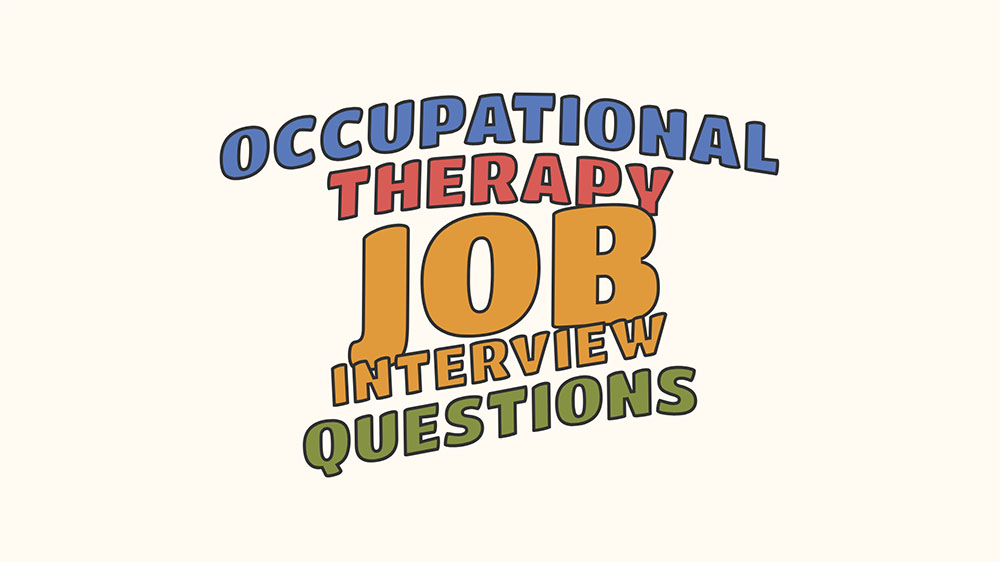
Nobody likes job interviews. Your nerves are off the charts, your palms are sweaty, you suddenly feel unrehearsed (regardless of how long you spent preparing), and you’re terrified you’ll freeze when it matters most.
One of the reasons OT interviews are so stressful is that conveying your skillset, training, and passion in such a short period of time can feel incredibly daunting.
That’s why, as with anything else in life, preparation makes a HUGE difference.
Planning ahead is key to nailing that occupational therapy interview and landing your dream OT job or COTA job. Outfits should be planned well ahead of time, cover letters and resumes should be updated and edited, nails should be immaculate—the list goes on.
But, as important as those external factors may be, preparing responses to interview questions that really highlight your unique skills is the real key to success.
Before you dare step into that office to meet with a potential employer, be sure to explore some of the questions you’ll likely need to answer during your occupational therapy job interview.
Here’s what we’ll cover:
- Questions about problem-solving
- Questions about you
- Questions about the employer
- Setting-specific questions to ask at the end of an OT job interview
- This includes acute care, SNF, home health, travel OT, school-based, PRN roles, and pediatric settings.
- Plus: How to follow up post-interview and (hopefully) negotiate your job offer!
Questions about problem-solving
“How do you deal with a difficult patient (or family member)?”
This is probably the most frequently asked question—not just in OT interviews, but in all healthcare interviews.
Be sure to answer in a way that lets the hiring manager know that you’re capable of patiently allowing a distressed client to express their feelings as you calmly provide feedback. A relaxed patient is a happy patient. And the same goes for family members!
In some cases, you might not be able to get the family member to relinquish control. To demonstrate your ability to handle this scenario, make sure you can provide some examples of ways you could gently ask this person to stay quiet (or leave the room) during the treatment. Or, explain how you might get the family member involved in the treatment.
“Describe a situation where you did not agree with management. How did you handle it?”
This question is hard, because an ideal candidate probably is not someone who could readily become confrontational with a management directive. 🙂
However, the interviewer wants to know that you are able to stand up for what you know is right—but in a positive and respectful way.
If you have any examples of a time that a manager’s choice wasn’t in the best interest of the facility or a patient, and you requested a private meeting to express that you hoped their decision would be reconsidered (with some facts to back up your argument), then that should do the trick.
“Tell me about a difficult situation and how you handled it.”
Generally speaking, a question like this is meant to suss how you approach problems and handle conflict.
One great example of how to answer this type of question would be explaining a time when two separate doctors gave conflicting orders and you had to figure out whose directions or protocol to follow.
The important thing to note is how you handled things without losing your cool, and your answer should prove that you were a stellar communicator in the process!
“What do you do when you get a patient who doesn’t speak English?”
Each facility likely has its own protocol for handling language barriers. Some facilities use those blue translation phones, while others use in-house translators or other solutions.
You can answer the question by explaining that you always adhere to the facility protocol, and if you feel that there’s any sort of “lost in translation” issues or confusion, you err on the side of caution rather than assuming you “sort of understand” what the patient means. Safety first!
“Can you recall a time when you felt your ethics were challenged? How did you handle it?”
Unfortunately, you can probably think of numerous times when you faced questionable ethics in the workplace.
It’s best to have an example in your back pocket for this question, just in case. If you’re not prepared, you might inadvertently put your foot in your mouth or come across as “throwing someone under the bus.”
When you’re answering a question like this, staying composed and professional is key; the hiring manager is testing your ability to maintain poise under pressure (and seeing if you are the type to talk smack about your former employer).
Questions about you
“What do you like to do in your free time?”
After all the time we spend preparing for questions about the role or the organization, it’s kind of ridiculous that this question sometimes trips us up. But it does—surprisingly often!
Many of us have trouble thinking of something to say when we’re put on the spot, so it’s a good idea to have an answer prepared in advance.
Don’t be too honest if you spend five hours a day on Facebook or Instagram, but don’t be a liar and say you volunteer at soup kitchens when really you did that once five years ago.
This question is meant to unearth what you’re like outside of your professional role, and to gain some insight about your personality.
Maybe you are an avid golfer, spend weekends in the garden, love hunting for antiques, or joyfully belt out karaoke every Friday night. Maybe you even wrote a rock opera about your cats! Think about it ahead of time and you’ll be fine.
“How would your friends describe you? How would your enemies describe you?”
This question can also take the form of: “What is your biggest strength?” And/or: “What is your biggest weakness?”
It does require some preparation in advance. Obviously, your friends would eagerly list all your positive attributes. That one’s a no-brainer!
However, being able to take one of your biggest weaknesses and spin it into something beneficial is an art form. Here’s an example: maybe your enemy would say you are nit-picky—when, in fact, you just have a divine eye for detail.
It can feel counter-intuitive to disclose a personal weakness during a job interview. But by framing your weaknesses as areas in which you want to grow, you can also demonstrate self-awareness and a commitment to professional development.
Don’t spend too much time harping on your weaknesses, but remember that nobody is 100% perfect at their job—so there’s no need to pretend you are! Showing you are eager to learn and improve is key.
“Why did you go into occupational therapy?”
This question is meant to assess your passion (or lack thereof) for your profession.
It’s no secret that productivity pushes and documentation woes are a sobering reality for therapists these days, and the hiring manager probably doesn’t want an embittered, burned-out therapist joining the team. If you can muster up true passion and provide a compelling answer, you’ll light up the room.
“Tell me about a time when you felt proud to be an OT practitioner.”
This is another one that gauges your passion for the profession, and it is a great opportunity to show that you can advocate for OT on the job.
Try to give an example of a time when you were able to educate another staff member and/or a patient or family member who initially didn’t see the value of OT services.
“What is the last book you read?”
If you’re not a big reader, no judgment here!
But you should still take note of the last book you read, who wrote it, and why you liked it. While this question only occasionally pops up in traditional (clinical) OT job interviews, you will often face something along these lines in interviews for non-traditional OT jobs.
“Why should we hire you?”
This question is almost always asked in any interview, regardless of the field. It’s a bit of a meatball. But, it does provide a terrific opportunity for you to sell yourself and reinforce that you are easily adaptable to the team/culture—and that you not only can perform the job, but will do so with spectacular results.
Questions about them
Questions about the role and facility are bound to pop up, and they’re generally very easy to prepare for in advance.
Be sure you take some time before the interview to learn about the company, department, and management team.
“What interests you most about this job?”
Maybe you’re interested in hand therapy, and this role involves some mentorship under a CHT.
Maybe the patient population is your absolute favorite.
Whatever it is, be sure to think about what makes you most excited for the role before you’re put on the spot to provide an answer. Take the time to do some research on the facility, and speak to why you would be a good fit for their particular organization.
Don’t make a rookie mistake like citing the high pay or flexible hours as reasons why you want the role. The interviewer wants to hear that you’re passionate about the work itself.
“Tell us about our hospital/facility/etc.”
Whoa, Nellie! This is what we call a “weed-out question.”
It’s meant to help the manager quickly eliminate candidates who didn’t take the time to learn about the company before an interview.
Prior to any job interview, you should do your research on the hiring organization—and keep in mind that flattery (without going overboard) will earn you some major brownie points.
For example, tell them you learned that they were named the number-one rehabilitation facility in the region—and that you would be honored to join such a high-caliber team. Or, share a personal story about a friend or family member who received top-notch treatment there (if you honestly have a story like this).
They’ll love the connection you feel with them. Just don’t lie or kiss their butts too much, or you will come off as insincere. There’s a fine line.
“Do you have any questions for us?”
A job interview should never be one-sided, where you feel like you’re being grilled endlessly without any chance to do a little interviewing of your own.
Job interviews should always allow you, the candidate, to ask questions about the management team, facility, other therapists, patient population, and more. Remember, hiring interviews are just as much about ensuring that the role is a good fit for you as they are about proving you are a good fit for the role. Here are some questions to ask:
- Can you describe a typical workday? If you leave an interview without a good idea of what your day-to-day work responsibilities will look like, then somebody dropped the ball! This is a great question to help you gain insight into productivity requirements, company culture, and opportunities for collaboration and mentorship.
- What type of person is the ideal candidate for this role? This is a great way to find out what they want in a candidate and decide whether you’re a good match for the team.
- What documentation system do you use? This is a good question to ask when you simply need to ask something 🙂 It can also serve as a lead-in to follow-up questions about where and when therapists typically complete their documentation (and whether you can expect to be taking work home with you).
- What are some of the department’s biggest challenges, and what are you doing to solve them? This is a great way to get the manager to open up a bit about some of the struggles you will face. If you really want to impress them, try to provide a suggestion for addressing one of the challenges the interviewer brings up—or mention an idea in your follow-up thank-you note.
- Why is this position open? I love asking this one to find out why the last person left. Or maybe nobody left, and the department is simply growing! It’s another window into the department’s inner-workings, which helps you determine whether you’re a good fit for the team.
Now, here are some setting-specific questions you can ask in your job interview.
Questions to ask in an acute care OT job interview:
These are derived from my conversation with David McGuire, OTR/L about his time working with an acute care OT team.
- What opportunities are there for growth?
- What is the staff tenure?
- Do you offer organization-funded continuing education?
- Are there productivity requirements?
- How does the rehab department fit into the economy of the organization?
- How is the OT team regarded and viewed professionally within the rehab department—and by the organization as a whole?
Additional questions to ask before you accept an offer:
- How many major/minor holidays do you require?
- Do you offer an incentive for working holidays?
- Are there weekend/evening differentials? (Essentially, how much more per hour would you make if you work nights or weekends?)
Questions to ask in a SNF OT job interview:
These were suggested in my conversation with Mandy Chamberlain, OTR/L, who was an SNF OT at the time.
- Is the company providing OT services for an internal or external company?
- Do you encourage program development?
- What are your work hours, and what happens if your census is low?
- What type of documentation system do you use?
- Will I be involved in care conferences with patients and family members?
- What is the percentage of long-term care residents versus short-term rehab residents?
- What are the daily productivity standards? Is it possible to have a lower standard for the first few weeks until I’m familiar with the job?
Additional questions to ask before you accept an offer:
- How much vacation time is offered?
- Are there weekend/evening/holiday differentials?
Questions to ask in a home health OT job interview:
These were suggested in my interview with Monika Lukasiewicz, OTR/L, who was a home health OT at the time.
- What are at least two qualities that make a home health OT successful in this company?
- What would it look like for an OT to be successful in this position? Please describe what it would look like from a management or team perspective.
- Why did past OTs leave this company?
- Please describe the documentation system/process for an average day (or at least for an average visit and an evaluation).
- Where do you hope the OT department of this company will be in five years? What are you doing to make that happen?
- What, if any, areas of expertise are either already present on the team—or are wanted on the team (e.g., lymphedema, cognition, vision, neuro, ortho, motivational interviewing)?
Additional questions to ask before you accept an offer:
- How many patients will I be expected to treat each day?
- Approximately how much mileage will I be expected to drive each week/day?
- Is mileage reimbursed?
Questions to ask in a traveling OT job interview:
These are derived from my interview with Emily Butler, OTD, OTR/L. Traveling OT interviews are a bit different, so these questions should be asked to the recruiter, rather than the hiring manager.
- Is medical coverage free for every placement? Also, how does medical coverage work between placements? For example, if I want to take a week off between placements, would I still have medical coverage?
- Is life insurance offered?
- Is there a meals and incidentals stipend?
- When placements are far away, are car rentals ever covered as part of the travel expense allowance?
- How much is the annual CEU allowance?
- Is there any opportunity for student loan repayment?
- Are there any opportunities for PTO?
- The website mentioned completion and renewal bonuses. Could you elaborate on this?
- Another OT and I are hoping to travel together. Is it always possible to get placements in or near the same place?
Additional questions to ask before you accept an offer for a specific facility:
- How many patients will I be expected to treat each day?
- Is documentation time built into the day?
- If the role is for a home health OT travel job: Approximately how much mileage will I be expected to drive each week/day? Is mileage reimbursed?
Questions to ask in a school-based OT job interview:
These were suggested by Lauren Jones of the Gotta Be OT blog.
- What is the primary service delivery model in Example County Schools (e.g., medical, educational, consultative, telehealth)?
- Is this position caseload-based or workload-based?
- What is the age range of the students I will be serving?
- What does new employee training look like (i.e., number of months/weeks, over the phone, in person, frequency of meetings)?
- How many therapists are employed by Example County Schools?
- How can I consult or connect with other therapists in Example County Schools?
- How many special education cases in Example County Schools have gone to due process within the past year?
Additional questions to ask before you accept an offer:
- What is the radius I will be expected to cover?
- Is there reimbursement for mileage?
- What type of equipment is available to me?
- What will I have to pay for out of pocket?
Questions to ask in a PRN occupational therapy job interview:
- Who will be available for me to contact if I have a question while filling in for someone?
- How will I be brought up to speed on my caseload before seeing patients?
- What training will be required throughout the year to maintain my PRN status?
- How will I be updated of changes to the department’s policies and procedures?
Additional questions to ask before you accept an offer:
- What is the minimum number of shifts/month required to maintain PRN status?
- What are the productivity standards for PRN staff?
- Can I be notified of my projected caseload a day prior to working? (You need to protect your time. You don’t want to plan for a full day if there are only one or two patients to be seen.)
- If the facility cancels last-minute, can I still be compensated for some of my time? (An example would be two hours of pay if the facility cancels within an hour of your shift.)
- Can I require being scheduled for a minimum number of hours per shift? (For example, you would only accept a shift if it is three or more hours.)
Questions to ask in an outpatient pediatric OT job interview:
- What is the typical age range of clients I will be working with?
- What therapeutic approaches are typically applied in this facility?
- What is the average number of clients therapists treat on a daily basis?
- How are families and caregivers involved in therapy?
- What does new employee onboarding look like? What opportunities are there for ongoing mentorship?
- What other team members are available, and what does professional collaboration look like on a daily or weekly basis?
Additional questions to ask before you accept an offer:
- If the facility has productivity requirements or uses an incentive model for paying therapists: Is productivity calculated based on caseload or actual workload? (Last-minute session cancellations are super common in OP pediatrics when family life gets busy!)
- What therapy materials are available to me, and can I receive reimbursement for additional materials?
After the interview
With some solid planning and thoughtful preparation, you are going to nail your OT job interview. So, what’s next?
How to follow up
It’s always a good idea to send a follow-up email within 24 hours of the interview to thank the recruiter or interviewer for their time—bonus points if you also send a hand-written note!
A follow-up email is also a great opportunity to:
- Express your continued interest in the position
- Reinforce the unique skills you bring to the table
- Clarify any muddy points from the interview
- Amend a flubbed response (for example, “After reflecting more on your question about X, I’d like to add…”)
Negotiating an OT job offer
Hopefully, your OT job interview leads to a job offer (yay)! Before you formally accept a position, take some time to review the written job offer and contemplate whether the role still feels like a good fit for you. This includes considering the population, setting, workload, and company culture—as well as the salary and benefits.
Some jobs offer a standard hourly rate that cannot be negotiated (many PRN positions are like this). More often, though, employers budget a salary range for any given position. Understanding broader compensation structures such as payroll software cost – can also provide insight into how organizations manage their budgets and how much flexibility they may have.
If a low starting salary is holding you back from accepting a position you feel passionate about, you may want to take on the common (yet daunting) task of negotiating your offer.
How do you know when you should negotiate a job offer? Before you enter a salary negotiation discussion, be sure to:
- Do your research. Research industry standards for similar positions in your area to establish what a reasonable salary range is for the job. Read more about OT salaries by practice area.
- Know your worth! You should be able to communicate your value and the relevant skills and experience you bring to the table. Ultimately, you want to land on a mutually agreed-upon number, so your goal is to help them see what makes you worth the salary you are asking for.
- Be honest. Consider the whole position, not just the pay. Don’t waste employers’ time by negotiating offers you aren’t actually interested in accepting. Being transparent and respectful throughout the hiring journey is more likely to get you what you want. It also sets the stage for a healthy working relationship if you do accept the job.
- Decide on your cut-off. Budgetary constraints might mean an employer is unable to offer you more—or as much as you were hoping for. Decide ahead of time what the role is worth to you, and be prepared to respond either way. While some employers have less leeway with salaries, they might have more flexibility in negotiating benefits such as PTO or sign-on bonuses.
Conclusion
There’s no need to lose sleep over OT job interviews. With proper preparation, they can actually be a lot of fun!
Rather than approaching interviews as incredibly stressful experiences where we have very little agency over the process, it’s best to look at them like dating: interviews are a great way to find out whether you are truly a good match for a particular role.
After all, everyone’s idea of a dream OT job is a little bit different. If you take the time to prepare in advance, you’ll be able to answer every question with poise—and ask exactly what you need to determine if the job is right for you.
Happy interviewing!





10 replies on “86 Occupational Therapy Job Interview Questions!”
This was an interesting informative blog post. I read it twice and sharing it on my every social media account. Thank you.
Thanks, Hiral!! Good luck withy any upcoming interviews!
Any thoughts on how to address behavioural interview questions when you don’t have a relevant example to provide?
Good question! Do you have a specific question in mind? Was it something related to managing a conflict. I feel like that is a common question.
Thank you for sharing these helpful professional tips. I’m currently in the last year of my schooling and it is nice to see some different types of questions I may be asked when pursuing my dream OT job 🙂
Thank you for these tips. I am trying to prepare myself as I am sure I will be doing many interviews in my travel therapy career. I think these are all good questions and I hope they don’t get too much more difficult than what you have here.
Thank you for these informative tips. I’m currently preparing for an interview and this post saved my life <3
This makes me so glad to hear!!! I hope you had an awesome interview!!
can anyone provide sample answer to those question that would be helpful
Wish I read this before I started my job hunt! (I accepted a job offer a couple of days ago 🙂 ) If I had read this 2 months ago, I would’ve nailed my interviews! This post is definitely informative and helpful!